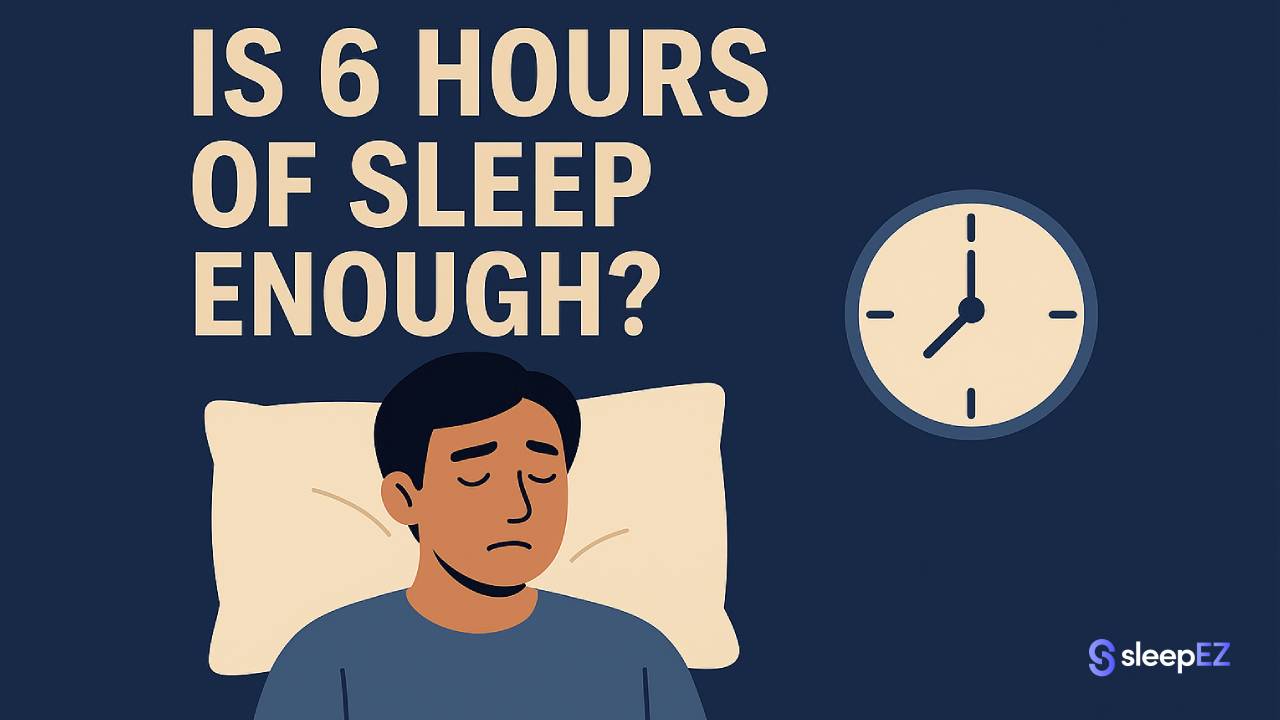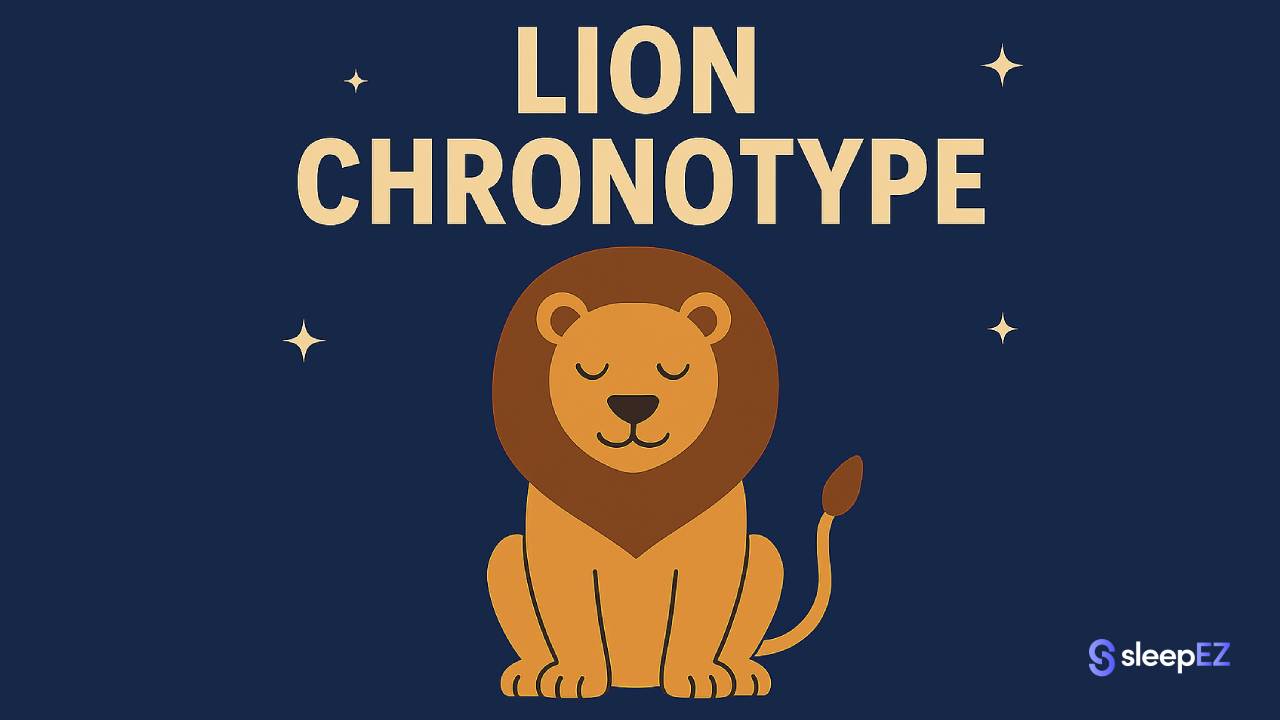For the vast majority of adults, the science is clear: 6 hours of sleep is not enough.
The Australian Government's healthdirect service states that most adults need 7 to 9 hours of sleep each night to feel refreshed and function at their best. This isn't just a suggestion. It's backed by decades of sleep research and endorsed by health authorities across Australia.
While you might feel like you can get by on 6 hours, this article explores what science says about the hidden risks and the true impact on your body and mind
The Recommended Sleep Duration
Australian health authorities are united on this: adults need 7 to 9 hours of sleep per night. This recommendation comes from extensive research into how our bodies and brains recover during sleep.
Your sleep happens in cycles. Each night, you move through light sleep, deep sleep, and REM (rapid eye movement) sleep. These stages serve different purposes. Light sleep helps you transition between wake and sleep. Deep sleep repairs your body and strengthens your immune system. REM sleep processes memories and supports brain function.
To get enough of each stage, particularly the restorative deep and REM sleep, you need a full 7 to 9 hours. Cutting this short means missing out on crucial recovery time.
What Happens to Your Body and Brain on Just 6 Hours of Sleep?
Getting only 6 hours of sleep triggers a cascade of problems in your body and mind. Some appear immediately. Others build up over time, creating serious health risks.
Short-Term Effects (The First Few Days)
Within days of sleeping only 6 hours, you'll notice:
- Daytime fatigue that coffee can't fix
- Difficulty concentrating on tasks
- Poor memory formation and recall
- Mood swings and increased irritability
- Slower reaction times
- Reduced problem-solving ability
These effects happen even if you don't feel tired. Research shows that people sleeping 6 hours perform worse on cognitive tests, even when they report feeling alert.
Long-Term Health Risks (Chronic Sleep Deprivation)
The Australian Institute of Health and Welfare reports that getting too little sleep increases your risk of several serious conditions, including type 2 diabetes, cardiovascular disease, coronary heart disease, and stroke.
Here's what chronic sleep deprivation does to your body:
Weakened Immune System: Your body produces fewer infection-fighting cells. You get sick more often and take longer to recover.
Increased Risk of Heart Disease and High Blood Pressure: Sleep deprivation raises stress hormones and inflammation markers. Your cardiovascular system works harder, increasing your risk of heart problems.
Higher Risk of Obesity and Type 2 Diabetes: Poor sleep disrupts hormones that control hunger and blood sugar. Ghrelin (which makes you hungry) increases, while leptin (which signals fullness) decreases. Your body also becomes less effective at processing glucose.
Accelerated Cognitive Decline: Better Health Victoria notes that sleep deprivation is linked to increased risk of both cognitive decline and dementia. Your brain needs sleep to clear out toxic proteins that build up during the day.
The Myth of the "Short Sleeper": Do Some People Genuinely Need Less Sleep?
You might think, "But I feel fine on 6 hours!" This is one of the most common misconceptions about sleep.
Scientists have identified a rare genetic variant called DEC2 that allows some people to function well on less sleep. These true "short sleepers" exist, but they're extremely rare. Less than 1% of the population carries this gene.
Most people who believe they're fine on 6 hours have simply adapted to their own impaired performance. They've forgotten what it feels like to be fully rested. When these same people get proper sleep for several weeks, they're often surprised by how much better they feel and perform.
Your brain is remarkably good at hiding sleep debt from your conscious awareness. You might feel alert while your cognitive performance, reaction time, and decision-making ability are significantly compromised.
How to Improve Your Sleep: Practical Steps to Get 7-9 Hours
Understanding the need for more sleep is the first step. The next is creating an environment and routine that makes quality sleep achievable. Here are practical, expert-approved strategies to help you reclaim your rest.
1. Create a Consistent Sleep Schedule
Go to bed and wake up at the same time every day, including weekends. This helps regulate your body's internal clock, making it easier to fall asleep and wake up naturally. Even shifting your schedule by an hour can disrupt this rhythm.
2. Optimize Your Bedroom into a Sleep Sanctuary
Your bedroom should be a haven for sleep: dark, quiet, and cool. Even small amounts of light or noise can disrupt your sleep cycle, pulling you out of the deep, restorative stages you need.
Control Light Exposure: Exposure to light suppresses your body's production of melatonin, the sleep hormone. To ensure total darkness, a comfortable Bluetooth sleep mask can be an excellent tool. It blocks out 100% of light while allowing you to listen to calming audio without uncomfortable earbuds.
Manage Noise: Unpredictable sounds like traffic, a snoring partner, or noisy neighbors are major sleep disruptors. To create a consistent, peaceful soundscape, consider using silicone earplugs. These block out sharp, sudden noises and are designed to be comfortable even for side sleepers. A sound machine for adults can also help by producing constant, soothing sounds like white noise or gentle rain that mask disruptive background noise, preventing your brain from being jolted awake.
Keep It Cool: Your body temperature naturally drops as you prepare for sleep. A room temperature between 16-19°C supports this natural process.
3. Establish a Relaxing Bedtime Routine
Signal to your brain that it's time to wind down. An hour before bed, dim the lights and engage in a calming activity like reading, gentle stretching, or meditation.
You can use your Bluetooth sleep mask to listen to guided meditation, a podcast, or calming music as the final step before you drift off, helping to quiet a racing mind.
4. Be Mindful of What You Consume
What you eat and drink affects your sleep quality:
- Stop consuming caffeine at least 6 hours before bedtime
- Limit alcohol, which disrupts sleep cycles and reduces sleep quality
- Avoid large meals within 3 hours of bedtime
- Stay hydrated during the day but reduce fluids 2 hours before sleep
Answering Your Top Questions
Can you fully function on 6 hours of sleep?
No. Objective performance is measurably impaired even if you don't feel it. Studies show deficits in reaction time, attention, and cognitive tasks after just one night of 6 hours of sleep. Your brain and body need more time to complete essential maintenance tasks.
Is 6 hours of sleep as bad as no sleep?
While not as immediately severe, research has shown that after just one week of sleeping only 6 hours a night, subjects' performance was as poor as someone who had been awake for 24 hours straight. The effects accumulate quickly.
Is 6 hours of sleep enough for a student or teenager?
Absolutely not. SA Health's guidelines show that teenagers need even more sleep than adults, typically 8-10 hours per night. Their brains are still developing, and adequate sleep is crucial for learning, memory consolidation, and emotional regulation. Sleep deprivation in young people is linked to poor academic performance, increased risk of accidents, and mental health problems.
What if I can only manage 6 hours due to my schedule?
If your current situation truly limits you to 6 hours, focus on maximizing sleep quality. Use the bedroom optimization strategies above, maintain a consistent schedule, and prioritize the sleep you can get. However, work toward finding ways to extend your sleep time, as this isn't sustainable long-term for your health.
Conclusion
The evidence is overwhelming: 6 hours of sleep is not a sustainable or healthy goal for the vast majority of people. While it might feel possible in the short term, chronic sleep restriction puts your physical health, mental performance, and emotional well-being at risk.
Getting adequate sleep isn't a luxury. It's a foundational pillar of health, just as important as proper nutrition and regular exercise. Your body uses sleep time to repair tissues, consolidate memories, and prepare for the next day.
Prioritizing your sleep is one of the most effective investments you can make in your long-term health and daily happiness. Start with small changes tonight, and give your body the rest it needs to function at its best.




Leave a comment
This site is protected by hCaptcha and the hCaptcha Privacy Policy and Terms of Service apply.